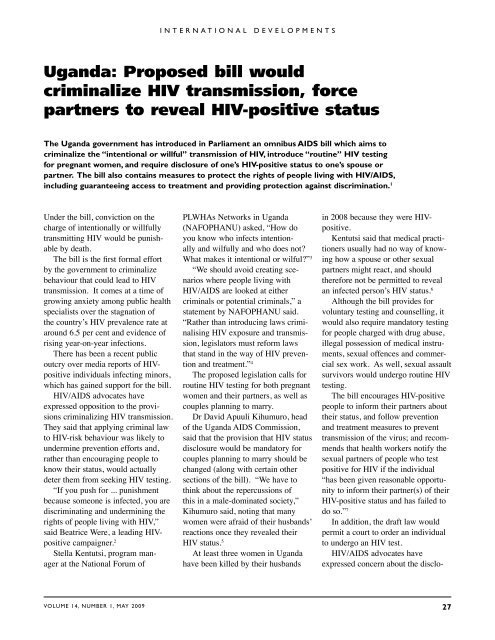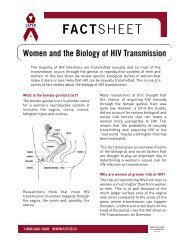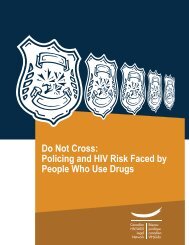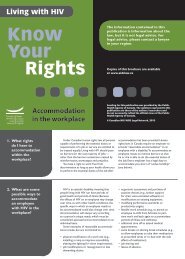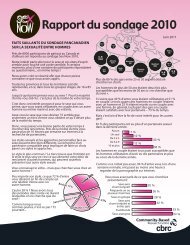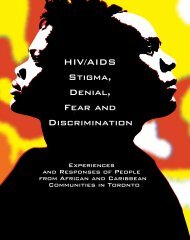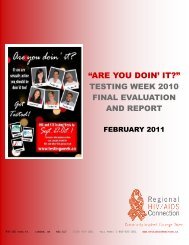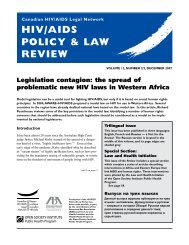HIV/AIDS Policy & Law Review, Volume 14, Number 1 ... - CATIE
HIV/AIDS Policy & Law Review, Volume 14, Number 1 ... - CATIE
HIV/AIDS Policy & Law Review, Volume 14, Number 1 ... - CATIE
You also want an ePaper? Increase the reach of your titles
YUMPU automatically turns print PDFs into web optimized ePapers that Google loves.
INTERNATIONAL DEVELOPMENTS<br />
Uganda: Proposed bill would<br />
criminalize <strong>HIV</strong> transmission, force<br />
partners to reveal <strong>HIV</strong>-positive status<br />
The Uganda government has introduced in Parliament an omnibus <strong>AIDS</strong> bill which aims to<br />
criminalize the “intentional or willful” transmission of <strong>HIV</strong>, introduce “routine” <strong>HIV</strong> testing<br />
for pregnant women, and require disclosure of one’s <strong>HIV</strong>-positive status to one’s spouse or<br />
partner. The bill also contains measures to protect the rights of people living with <strong>HIV</strong>/<strong>AIDS</strong>,<br />
including guaranteeing access to treatment and providing protection against discrimination. 1<br />
Under the bill, conviction on the<br />
charge of intentionally or willfully<br />
transmitting <strong>HIV</strong> would be punishable<br />
by death.<br />
The bill is the first formal effort<br />
by the government to criminalize<br />
behaviour that could lead to <strong>HIV</strong><br />
transmission. It comes at a time of<br />
growing anxiety among public health<br />
specialists over the stagnation of<br />
the country’s <strong>HIV</strong> prevalence rate at<br />
around 6.5 per cent and evidence of<br />
rising year-on-year infections.<br />
There has been a recent public<br />
outcry over media reports of <strong>HIV</strong>positive<br />
individuals infecting minors,<br />
which has gained support for the bill.<br />
<strong>HIV</strong>/<strong>AIDS</strong> advocates have<br />
expressed opposition to the provisions<br />
criminalizing <strong>HIV</strong> transmission.<br />
They said that applying criminal law<br />
to <strong>HIV</strong>-risk behaviour was likely to<br />
undermine prevention efforts and,<br />
rather than encouraging people to<br />
know their status, would actually<br />
deter them from seeking <strong>HIV</strong> testing.<br />
“If you push for ... punishment<br />
because someone is infected, you are<br />
discriminating and undermining the<br />
rights of people living with <strong>HIV</strong>,”<br />
said Beatrice Were, a leading <strong>HIV</strong>positive<br />
campaigner. 2<br />
Stella Kentutsi, program manager<br />
at the National Forum of<br />
PLWHAs Networks in Uganda<br />
(NAFOPHANU) asked, “How do<br />
you know who infects intentionally<br />
and wilfully and who does not?<br />
What makes it intentional or wilful?” 3<br />
“We should avoid creating scenarios<br />
where people living with<br />
<strong>HIV</strong>/<strong>AIDS</strong> are looked at either<br />
criminals or potential criminals,” a<br />
statement by NAFOPHANU said.<br />
“Rather than introducing laws criminalising<br />
<strong>HIV</strong> exposure and transmission,<br />
legislators must reform laws<br />
that stand in the way of <strong>HIV</strong> prevention<br />
and treatment.” 4<br />
The proposed legislation calls for<br />
routine <strong>HIV</strong> testing for both pregnant<br />
women and their partners, as well as<br />
couples planning to marry.<br />
Dr David Apuuli Kihumuro, head<br />
of the Uganda <strong>AIDS</strong> Commission,<br />
said that the provision that <strong>HIV</strong> status<br />
disclosure would be mandatory for<br />
couples planning to marry should be<br />
changed (along with certain other<br />
sections of the bill). “We have to<br />
think about the repercussions of<br />
this in a male-dominated society,”<br />
Kihumuro said, noting that many<br />
women were afraid of their husbands’<br />
reactions once they revealed their<br />
<strong>HIV</strong> status. 5<br />
At least three women in Uganda<br />
have been killed by their husbands<br />
in 2008 because they were <strong>HIV</strong>positive.<br />
Kentutsi said that medical practitioners<br />
usually had no way of knowing<br />
how a spouse or other sexual<br />
partners might react, and should<br />
therefore not be permitted to reveal<br />
an infected person’s <strong>HIV</strong> status. 6<br />
Although the bill provides for<br />
voluntary testing and counselling, it<br />
would also require mandatory testing<br />
for people charged with drug abuse,<br />
illegal possession of medical instruments,<br />
sexual offences and commercial<br />
sex work. As well, sexual assault<br />
survivors would undergo routine <strong>HIV</strong><br />
testing.<br />
The bill encourages <strong>HIV</strong>-positive<br />
people to inform their partners about<br />
their status, and follow prevention<br />
and treatment measures to prevent<br />
transmission of the virus; and recommends<br />
that health workers notify the<br />
sexual partners of people who test<br />
positive for <strong>HIV</strong> if the individual<br />
“has been given reasonable opportunity<br />
to inform their partner(s) of their<br />
<strong>HIV</strong>-positive status and has failed to<br />
do so.” 7<br />
In addition, the draft law would<br />
permit a court to order an individual<br />
to undergo an <strong>HIV</strong> test.<br />
<strong>HIV</strong>/<strong>AIDS</strong> advocates have<br />
expressed concern about the disclo-<br />
VOLUME <strong>14</strong>, NUMBER 1, MAY 2009 27


